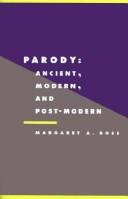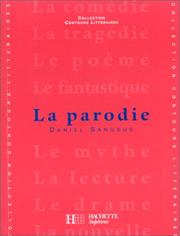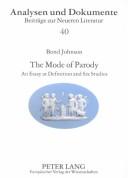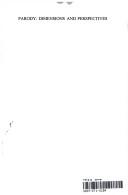| Listing 1 - 10 of 88 | << page >> |
Sort by
|
Book
Year: 1973 Publisher: Bruxelles Arcade
Abstract | Keywords | Export | Availability | Bookmark
 Loading...
Loading...Choose an application
- Reference Manager
- EndNote
- RefWorks (Direct export to RefWorks)
Human medicine --- parody

ISBN: 0521429242 0521418607 9780521429245 Year: 1993 Volume: 3 Publisher: Cambridge Cambridge University Press
Abstract | Keywords | Export | Availability | Bookmark
 Loading...
Loading...Choose an application
- Reference Manager
- EndNote
- RefWorks (Direct export to RefWorks)
Literature --- Parodie --- Parody --- Littérature --- --Théorie --- --Parodie --- --Parody --- 82-7 --- Humor. Satire --- Parody. --- 82-7 Humor. Satire --- Comic literature --- Literature, Comic --- Travesty --- Satire --- Burlesque (Literature) --- Caricature --- 82-7 Prose satire. Humour, epigram, parody etc. --- Prose satire. Humour, epigram, parody etc. --- Théorie
Book
ISBN: 0820401447 9780820401447 Year: 1984 Publisher: New York, N.Y. Lang
Abstract | Keywords | Export | Availability | Bookmark
 Loading...
Loading...Choose an application
- Reference Manager
- EndNote
- RefWorks (Direct export to RefWorks)
Poetry --- Fiction --- Drama --- Parody --- Congresses --- -82-7 --- Comic literature --- Literature, Comic --- Travesty --- Satire --- Burlesque (Literature) --- Caricature --- Humor. Satire --- 82-7 Humor. Satire --- 82-7 --- 82-7 Prose satire. Humour, epigram, parody etc. --- Prose satire. Humour, epigram, parody etc. --- Parody - Congresses
Book
ISBN: 9781409430308 1409430308 Year: 2012 Publisher: Farnham Ashgate
Abstract | Keywords | Export | Availability | Bookmark
 Loading...
Loading...Choose an application
- Reference Manager
- EndNote
- RefWorks (Direct export to RefWorks)
parody --- Painting --- Iconography --- Carnival [pre-Lenten festival] --- komedie --- anno 1500-1599 --- Parody in art. --- Comic, The, in art --- Art and society --- History --- Art and society - Europe - History
Book
ISBN: 3879400024 Year: 1970 Publisher: Konstanz Universitätsverlag
Abstract | Keywords | Export | Availability | Bookmark
 Loading...
Loading...Choose an application
- Reference Manager
- EndNote
- RefWorks (Direct export to RefWorks)
Book
ISBN: 0198117930 Year: 1990 Publisher: Oxford Clarendon
Abstract | Keywords | Export | Availability | Bookmark
 Loading...
Loading...Choose an application
- Reference Manager
- EndNote
- RefWorks (Direct export to RefWorks)
English literature --- Drama --- 82-7 --- Humor. Satire --- 82-7 Humor. Satire --- 82-7 Prose satire. Humour, epigram, parody etc. --- Prose satire. Humour, epigram, parody etc.

ISBN: 2010195515 9782010195518 Year: 1994 Publisher: Paris Hachette
Abstract | Keywords | Export | Availability | Bookmark
 Loading...
Loading...Choose an application
- Reference Manager
- EndNote
- RefWorks (Direct export to RefWorks)
Literature --- Parodie. --- 82-7 --- Humor. Satire --- 82-7 Humor. Satire --- 82-7 Prose satire. Humour, epigram, parody etc. --- Prose satire. Humour, epigram, parody etc.
Book
ISBN: 1350060526 9781350060524 9781350060517 9781350166288 9781350060531 1350060542 1350060534 1350060518 1350166286 Year: 2020 Publisher: London Bloomsbury Academic
Abstract | Keywords | Export | Availability | Bookmark
 Loading...
Loading...Choose an application
- Reference Manager
- EndNote
- RefWorks (Direct export to RefWorks)
"This book argues that Old Comedy's parodic and non-parodic engagement with tragedy, satyr play, and contemporary lyric is geared to enhancing its own status as the preeminent discourse on Athenian art, politics and society. Donald Sells locates the enduring significance of parody in the specific cultural, social and political subtexts that often frame Old Comedy's bold experiments with other genres and drive its rapid evolution in the late fifth century. Close analysis of verbal, visual and narrative strategies reveals the importance of parody and literary appropriation to the particular cultural and political agendas of specific plays. This study's broader, more flexible definition of parody as a visual - not just verbal - and multi-coded performance represents an important new step in understanding a phenomenon whose richness and diversity exceeds the primarily textual and literary terms by which it is traditionally understood."--Bloomsbury Publishing This book argues that Old Comedy's parodic and non-parodic engagement with tragedy, satyr play, and contemporary lyric is geared to enhancing its own status as the preeminent discourse on Athenian art, politics and society. Donald Sells locates the enduring significance of parody in the specific cultural, social and political subtexts that often frame Old Comedy's bold experiments with other genres and drive its rapid evolution in the late fifth century. Close analysis of verbal, visual and narrative strategies reveals the importance of parody and literary appropriation to the particular cultural and political agendas of specific plays. This study's broader, more flexible definition of parody as a visual - not just verbal - and multi-coded performance represents an important new step in understanding a phenomenon whose richness and diversity exceeds the primarily textual and literary terms by which it is traditionally understood
Greek drama (Comedy) --- Parody in literature --- History and criticism --- E-books --- Drama --- Thematology --- Classical Greek literature --- Parody in literature. --- History and criticism.

ISBN: 363135729X 0820443808 Year: 2000 Volume: 40 Publisher: Frankfurt am Main Lang
Abstract | Keywords | Export | Availability | Bookmark
 Loading...
Loading...Choose an application
- Reference Manager
- EndNote
- RefWorks (Direct export to RefWorks)
Literature --- Parody. --- Parody in literature. --- Parodies --- European literature --- Parodie --- Parodie dans la littérature --- Littérature européenne --- History and criticism. --- Histoire et critique --- 82-7 --- Humor. Satire --- 82-7 Humor. Satire --- Parodie dans la littérature --- Littérature européenne --- 82-7 Prose satire. Humour, epigram, parody etc. --- Prose satire. Humour, epigram, parody etc.

ISBN: 9042002174 1134674279 1134674287 0203451333 1280318988 9780203451335 0203759575 9780203759578 9780415182201 0415182204 9780415182218 0415182212 9786610318988 6610318980 9781134674282 9781280318986 9781134674237 1134674236 9781134674275 Year: 2000 Publisher: London Routledge, Taylor and Francis Group
Abstract | Keywords | Export | Availability | Bookmark
 Loading...
Loading...Choose an application
- Reference Manager
- EndNote
- RefWorks (Direct export to RefWorks)
This lively introduction demonstrates the importance of parody for literary and cultural studies, clearly explaining complex arguments around it.
82-7 --- Humor. Satire --- Parody --- Congresses. --- 82-7 Humor. Satire --- Comic literature --- Literature, Comic --- Travesty --- Satire --- Burlesque (Literature) --- Caricature --- Congresses --- 82-7 Prose satire. Humour, epigram, parody etc. --- Prose satire. Humour, epigram, parody etc. --- Parody. --- Satire. --- Literature --- Wit and humor --- Invective --- Imitation (littérature) --- Burlesque (littérature) --- Parodie (littérature) --- Imitation (littérature) --- Burlesque (littérature) --- Parodie (littérature) --- Literary semiotics
| Listing 1 - 10 of 88 | << page >> |
Sort by
|

 Search
Search Feedback
Feedback About UniCat
About UniCat  Help
Help News
News